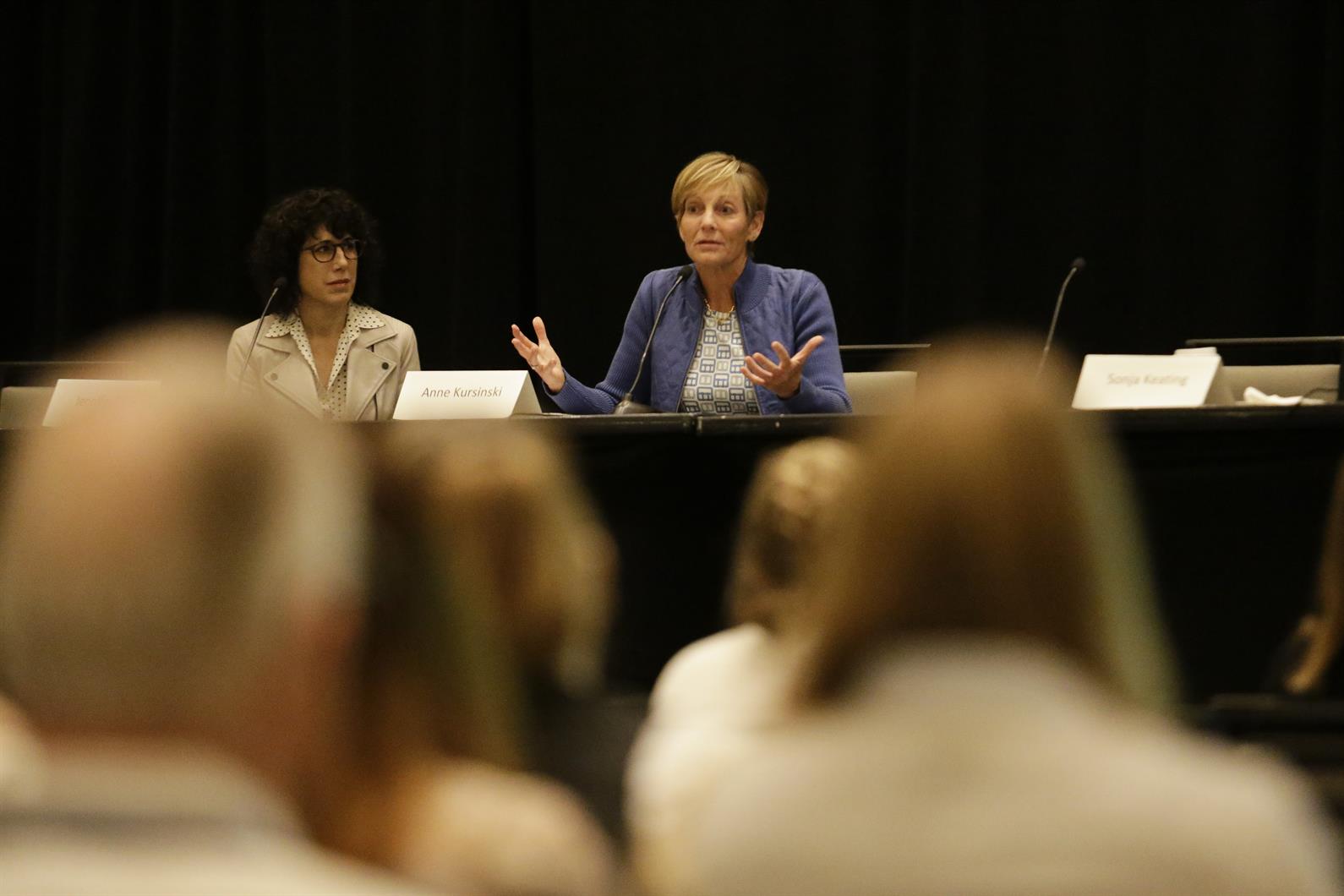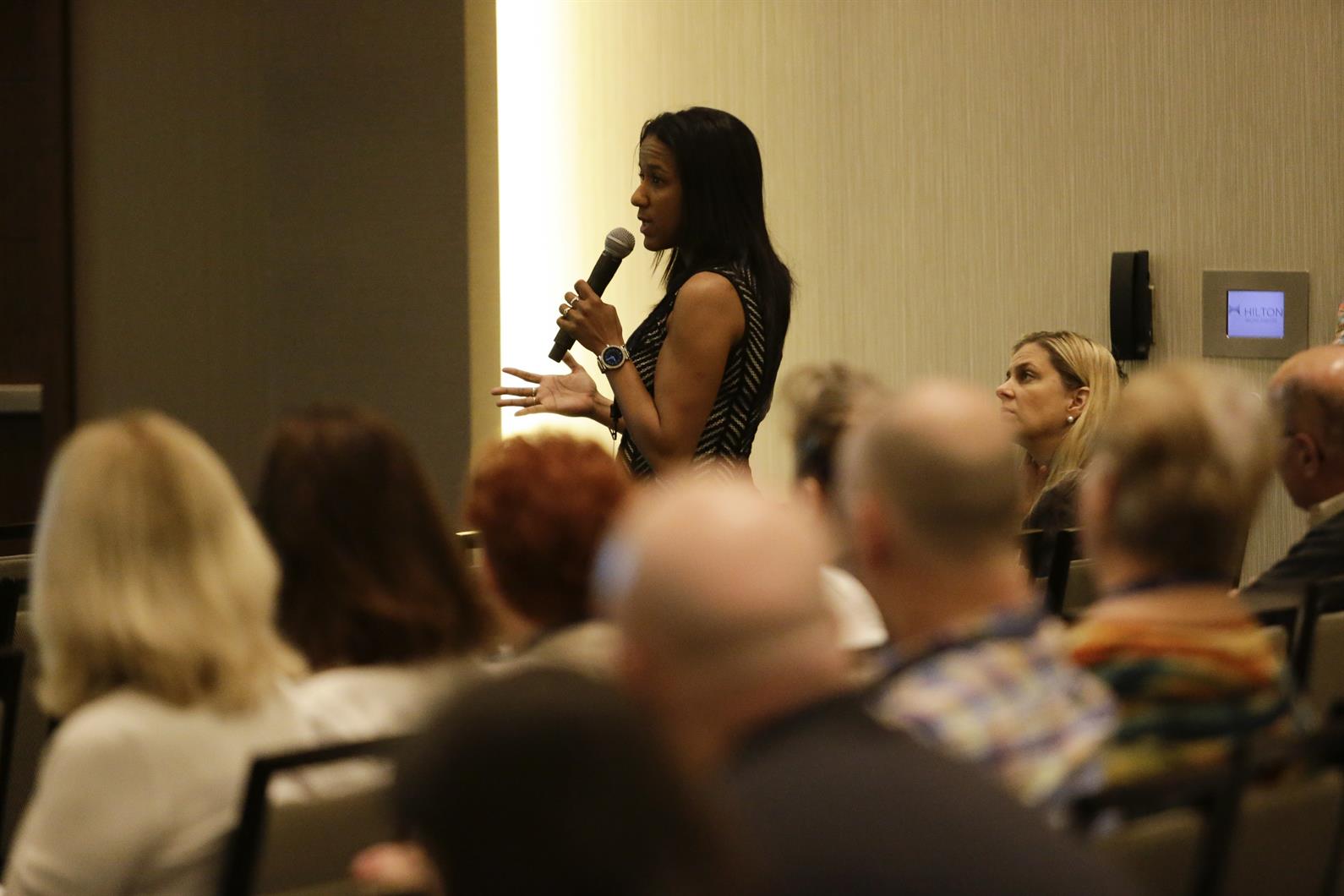
Last year was a breakthrough year for legislation and education surrounding the U.S. Center for SafeSport’s Code and the US Equestrian Safe Sport Policy and requirements for its members. In the wake of the #metoo movement and over 200 gymnasts who came forward about abuse they suffered at the hands of Larry Nassar, equestrians and non-equestrians alike stepped forward to break the silence and the barrier for men and women of all ages surrounding the difficult topic of sexual abuse.
In an effort to continue to educate US Equestrian members and horsemen and women across the spectrum of the sport, US Equestrian invited five-time Olympian and sexual abuse survivor Anne Kursinski, alongside fellow panelist and survivor Jennifer Fox, filmmaker of the acclaimed HBO film The Tale, and W. Scott Lewis, an attorney with expertise in sexual misconduct in educational institution settings and sports, to speak to members in an open forum with moderator Sonja Keating, General Counsel for US Equestrian.
Fox and Kursinski shared their stories of abuse, how powerful men groomed and took advantage of them, and how breaking their silence was about helping others to do the same. Questions from the audience about the U.S. Center for SafeSport’s procedures and processes were answered by Lewis, and all three panelists shared the general and powerful sentiment that it is time for a cultural shift surrounding the topic of sexual abuse –and that equestrian sport can help to lead the way in curbing abuse across all sports.
Five Takeaways from the SafeSport Panelists:
- Sexual abuse between an adult and child is often disguised under the ruse of “love,” and the child perceives it as such
- Education is important: people close to a sexual abuse survivor may sense that something bad is happening/has happened, but may feel they do not know enough to report
- Abusers are not often obvious, but are often seen as powerful; they groom their victims and those around them, helping to keep the abuse a secret
- The U.S. Center for SafeSport is an impartial hearing body that makes impartial decisions; their goal is to use evidence to determine whether violations of the SafeSport Code have occurred
- Taking SafeSport training is about much more than training and education; protecting even just one child by being aware of the signs of abuse can help to protect everyone
Five Quotes from the SafeSport Panelists:
“I am not an expert on sexual abuse by any means; I am a filmmaker and a human being, of course. I have been making films for 20 years. … I had an event where I had a relationship with a coach when I was 13 … a very immature 13 … My relationship with my coach began when I was about 13 and he was about 40. This was something that I called a relationship from that time until I was in my mid-40s. So if you asked me up until that time, I would say my first love affair was this man, an older man, and I stuck to that story. …The mind protects oneself as long as it can. It is so scary to come forward that we do not often report. In my case, I think it was an inner defense.” – Jennifer Fox

“I’m so thankful for what I learned and the horsemanship, but it was really hell. And going back through it this last year, it was hell. … But there is this thing inside of me to help other children. [Sexual abuse] doesn’t have to happen, it shouldn’t happen. I could have been great without that. … The abuse of power is the biggest thing, and the complications that come with that. … All I wanted to do was to ride and be the best rider I could be, the best horsewoman I could be, [the abuse] didn’t have to happen to me for me to have that life. So if I can help somebody else speak up, you can help somebody else. Don’t be silent, [this] doesn’t have to happen, stop the predators.” – Anne Kursinski
“Competing, as a professional or at a higher level or in college, is a privilege, and it comes with certain responsibilities. So if you don’t want those responsibilities, then don’t compete. Nobody needs to compete, but the cultural shift needs to change.” – W. Scott Lewis
“Child sexual abuse is not a new thing or a modern scourge of the modern world. It has been going on for thousands and thousands of years. I think we have to actually applaud ourselves that for the first time in recorded history we are outraged and have made an attempt to slow down this horror. …
“The other thing is that up until this moment, people always thought of abusers as sort of these dark, ugly figures that hide in shadows and really anybody could recognize them. Of course, we know now today that that is completely untrue, that abusers look like everybody. They are nice people. They are charismatic people. They are people you would leave your children with. You will not recognize them. So one of the things we can do is slow down and see the minute signs that happen in adult behavior and children behavior when lines are being crossed. … Know that anyone can help save a child. It’s not just you, other children can report. The fact that SafeSport is asking that other riders take this training, they can help save their friends, as well as you can help save your clients. It is all about education, because [abuse] is so subtle. We just have to become better human beings and we have this opportunity. It’s not about the equestrian community – it’s about the whole world, all sports, all people; but you as equestrians can really make a difference.” – Jennifer Fox
“People knew at the riding club when I was little [about the abuse]. To see this grooming and what things were going on, I think it could have been stopped. My biggest thing for taking the training is the education. I have had clients and friends that have taken it and some of them have said, ‘Oh my gosh, it’s going to take forever and I have to do it on a computer,’ and then after, ‘I learned so much, I never knew that,’ so it’s just this whole other level of awareness. [The SafeSport training] is an educational piece, but also [an opportunity] to tell your clients that they could help save one child. And out of their whole lifetime, to take an hour or two and maybe you could help some child and educate yourself, I think [the SafeSport training] is so worth it.” – Anne Kursinski
Watch the entire SafeSport Panel – What You Need to Know on demand on the USEFNetwork.
US Equestrian’s website has a library of resources about SafeSport, including ways to report suspected abuse, FAQ’s on how to complete the SafeSport training, and more. Visit USequestrian.org’s SafeSport page to learn more.
Learn more about Jennifer Fox and her acclaimed film, The Tale and watch Anne Kursinski’s SafeSport PSA.
A free screener for The Tale is available for individuals or groups. Email Vicki Lowell for more information.
Want more articles like this delivered to your inbox every week? Sign up here to receive our free Equestrian Weekly newsletter.
This article is original content produced by US Equestrian and may only be shared via social media. It is not to be repurposed or used on any other website aside from usequestrian.org.


